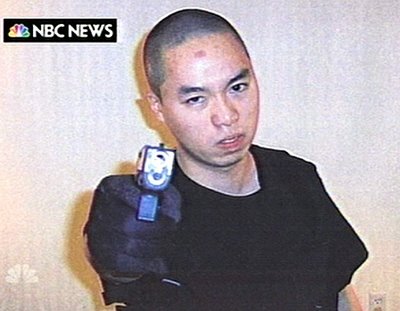And so the blame game commences.
The blood has been washed off, the funerals are beginning, classes recommence on Monday, so it's time to move on from the pictures of the bullet-ridden pretty girls and on to finding something to blame. With Columbine, instead of wondering where the parents had been and how the teenagers had been able to get their hands on their arsenal, they quickly found out that Marilyn Manson was most definitely the one who was really responsible, despite the boys' both disliking his music, as well as the first-person-shooter Doom, which the boys had at least played.

The Daily Mail then has started the ball rolling by noting the striking similarities between some of the poses struck by Cho and by two of the characters in the Korean film Oldboy, directed by Chan-wook Park. Notice that? It's a Korean film, and Cho was Korean. QED, right? QED! The whole article is a sensationalist, over-the-top joke:
Just a slight problem here. Cho was a 23-year-old college student suffering from mental illness. In Oldboy, Oh Dae-Su is imprisoned for 15 years without knowing the reason, then released and given 5 days to find out why. The only use of guns in the film is the image depicted on the front page of the Mail, which also coincidentally spoils part of the ending. It does feature cathartic and visceral violence, but the wider themes of redemption, forgiveness and the eventual emptiness of the revenge itself are just as prominent. Cho's stance with the hammer does seem similar to that of Oh Dae-Su played by Min-sik Choi, but Dae-Su also eats a live octopus in one scene, something that Cho has yet to have been proved to have done.
With whom exactly is Cho supposed to have identified with? Oh Dae-Su, who spends 15 years wondering who he damaged so much that they'd pay to have him locked up, or with Woo-jin Lee, the character that's tormented by his involvement with the death of his sister while they were both teenagers? Woo-jin Lee, as Peter Bradshaw wrote in his review of the film, is so Bond villain-esque that it seems difficult that Cho would have sympathised with his plight; indeed, despite his stunning good looks, he's a broken man of appearances. Cho was most certainly broken, but it seems more likely by his own failure to fit in and his whole subsequent avoidance from the world and reality as a whole. It really is a case of seeing resemblances and clutching at straws.
Oh, I don't know. Richard Littlejohn used to have a TV show on Sky.
Speaking of clutching at straws, Lenin identifies how the usual suspects have already tried to link Cho's murderous rampage to Islam. Elsewhere, this blog rounds up all the current blaming that's started and that's probably yet to get into full swing.
Update: Oh God. Gerald Kaufman, the obnoxious Labour MP, has also been pointing the finger at Oldboy, even though he describes it as a splatter film, which it certainly is not, which ought to make you wonder whether he's even seen it. As someone commenting mentions, this is the guy who's Chairman of the Culture, Media and Sport Select Committee. Thankfully, the Telegraph has provided its own fisk.

The Daily Mail then has started the ball rolling by noting the striking similarities between some of the poses struck by Cho and by two of the characters in the Korean film Oldboy, directed by Chan-wook Park. Notice that? It's a Korean film, and Cho was Korean. QED, right? QED! The whole article is a sensationalist, over-the-top joke:
He wouldn't have drawn much attention as he strolled across the campus.
Cho Seung-Hui was just another anonymous face that morning among the scores of people criss-crossing the sweeping lawns and wide, sunlit streets of Virginia Tech university.
It was approaching 9am and everyone was preparing for the start of the college week.
But the 23-year-old Korean was on a mission. He had just killed the teenage brunette with whom he is thought to have been infatuated, and blasted to death the college prefect who appears to have come to her aid.
Now he was about to play the leading role in a sickening finale to what would become America's most devastating gun massacre.
In his twisted mind he carried images of a violent Korean movie that appears to have scripted his thoughts.
Just a slight problem here. Cho was a 23-year-old college student suffering from mental illness. In Oldboy, Oh Dae-Su is imprisoned for 15 years without knowing the reason, then released and given 5 days to find out why. The only use of guns in the film is the image depicted on the front page of the Mail, which also coincidentally spoils part of the ending. It does feature cathartic and visceral violence, but the wider themes of redemption, forgiveness and the eventual emptiness of the revenge itself are just as prominent. Cho's stance with the hammer does seem similar to that of Oh Dae-Su played by Min-sik Choi, but Dae-Su also eats a live octopus in one scene, something that Cho has yet to have been proved to have done.
With whom exactly is Cho supposed to have identified with? Oh Dae-Su, who spends 15 years wondering who he damaged so much that they'd pay to have him locked up, or with Woo-jin Lee, the character that's tormented by his involvement with the death of his sister while they were both teenagers? Woo-jin Lee, as Peter Bradshaw wrote in his review of the film, is so Bond villain-esque that it seems difficult that Cho would have sympathised with his plight; indeed, despite his stunning good looks, he's a broken man of appearances. Cho was most certainly broken, but it seems more likely by his own failure to fit in and his whole subsequent avoidance from the world and reality as a whole. It really is a case of seeing resemblances and clutching at straws.
As he turned the gun on himself, it is difficult to imagine that he didn't allow himself a rare smile.
For while police scrambled hopelessly to bring his killing spree to an end, he still held the power to control the finale from beyond the grave, which is precisely what he wanted.
Seldom have 28 poor-quality video clips and the monotone rantings of a deluded maniac been given so much air time.
Oh, I don't know. Richard Littlejohn used to have a TV show on Sky.
Speaking of clutching at straws, Lenin identifies how the usual suspects have already tried to link Cho's murderous rampage to Islam. Elsewhere, this blog rounds up all the current blaming that's started and that's probably yet to get into full swing.
Update: Oh God. Gerald Kaufman, the obnoxious Labour MP, has also been pointing the finger at Oldboy, even though he describes it as a splatter film, which it certainly is not, which ought to make you wonder whether he's even seen it. As someone commenting mentions, this is the guy who's Chairman of the Culture, Media and Sport Select Committee. Thankfully, the Telegraph has provided its own fisk.
Labels: blame game, Cho Seung-hui, Daily Mail-watch, moral panics, Virginia Tech massacre


